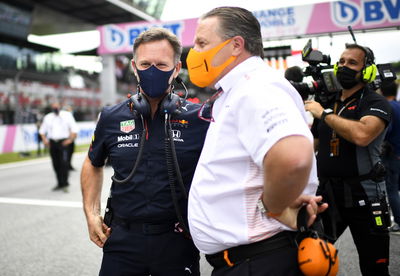F1 teams “holding the sport hostage” in bid to increase cost cap - Brown

F1 introduced a cost cap of $145 million for 2021 to level the playing field, with the figure dropping to $140m for 2022 and then $135m for 2023.
With F1 expected to run its sprint race format at six grands prix in 2022 - three more than it did in 2021 - some teams have been pushing to raise the cost cap to cover potential damage sustained in the additional sprint races.
Brown revealed that some teams are demanding to raise the cost cap by "an inordinate amount of money" to "protect from their competitive advantage being eroded".
“We must continue to drive economic sustainability across the sport," Brown wrote in a column on McLaren’s website. “Some teams still look for excuses to raise the cost cap and win world championships with chequebooks.
“The ongoing lobbying by certain teams to increase the cost cap for sprint race damage is a continuing example. The Saturday sprint race initiative by Formula 1 has added new viewers and raised the profile of the sport to expand its global fanbase.
“However, these teams continue to demand a raise to the cost cap by an inordinate amount of money, despite the clear evidence that little damage was incurred during these races last year, in a thinly veiled attempt to protect from their competitive advantage being eroded.
“The current governance structure of the sport enables a situation where some teams, to protect their own competitive advantage, are effectively holding the sport hostage from what’s best for the fans and therefore the sport at large."
Brown continued to express his frustrations, claiming that some rival teams can’t accept that financial restrictions are in the best interests of F1 as a whole.
“These teams seem unable to accept that a budget cap is in the best interests of the sport and cannot kick their habit of spending their way to the front," he added.
“The combination of our talent and know-how with investments from our shareholders, partners and robust financial stewardship has positioned us well for the next stage in our competitive journey. And our opportunity to be competitive has been underpinned with the introduction of the budget cap in F1.
"With the spending limit reducing to $140m this year and $135m next, the new financial regulations present us – and the sport as a whole – with a fairer framework to compete by reducing the inevitable advantage of the biggest-spending and best-resourced teams."

![Toprak Razgatlioglu, ROKiT BMW Motorrad, BMW M 1000 RR [Gold & Goose]](https://cdn.crash.net/2024-09/GnG_1165424_HiRes.jpg?height=90)






![Johann Zarco, LCR, Honda RC213V, 2024 San Marino MotoGP, Misano, action [Gold & Goose]](https://cdn.crash.net/2024-09/GnG_1166323_HiRes.jpg?height=90)

![Jack Miller, KTM Factory Racing, KTM RC16, San Marino MotoGP, Misano, action [Gold & Goose]](https://cdn.crash.net/2024-09/GnG_1167624_HiRes.jpg?height=90)